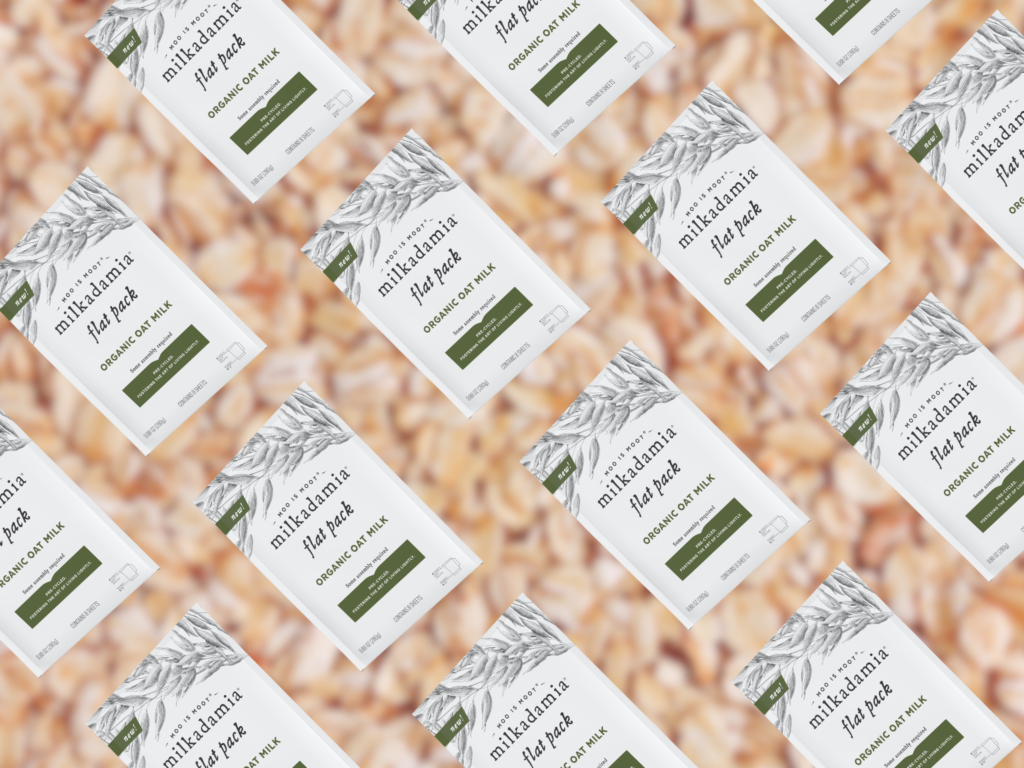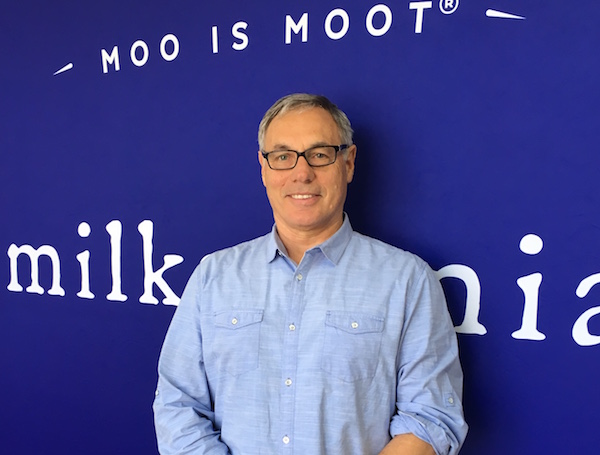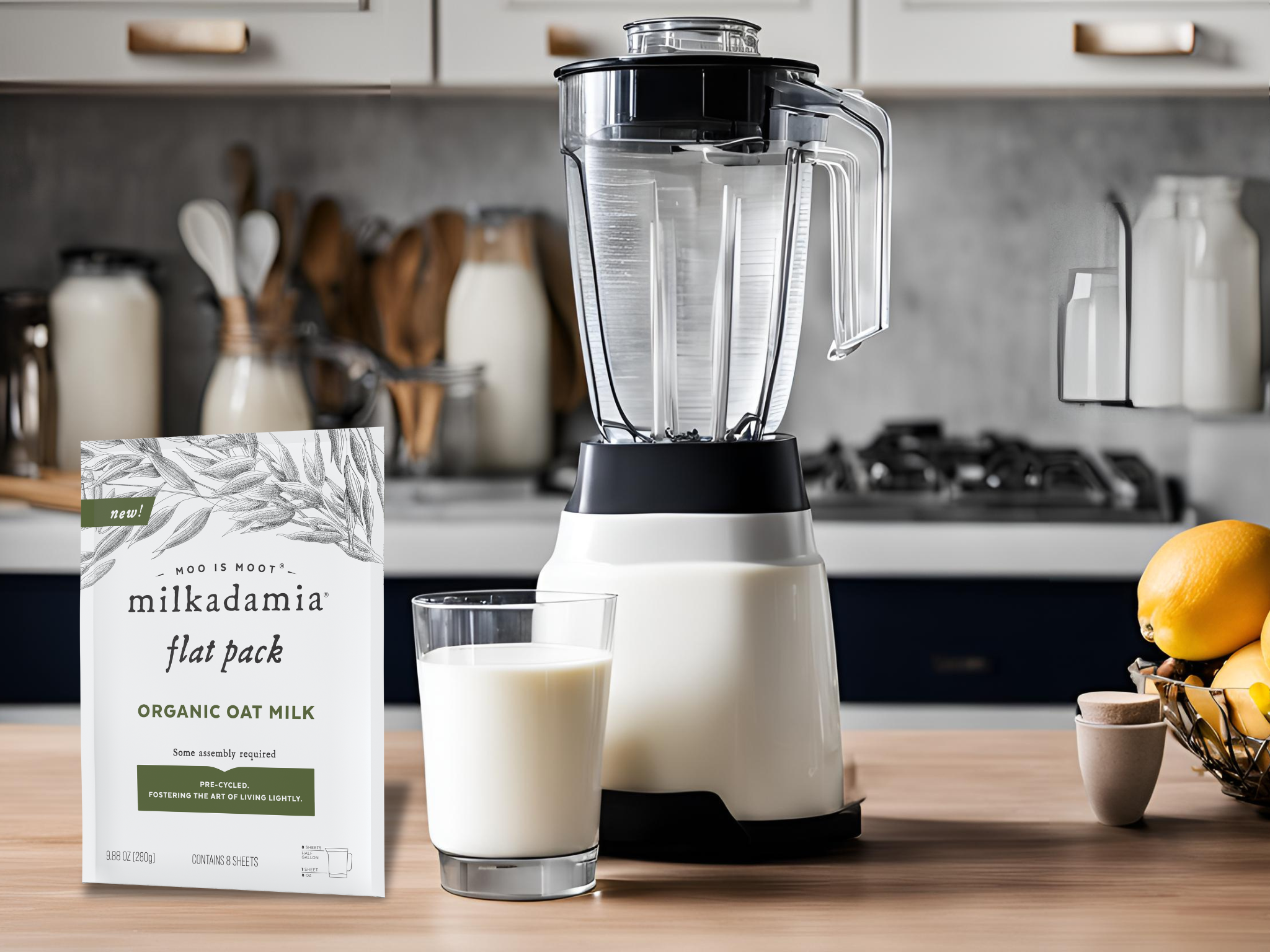Milkadamia Dunks Into Oat Milk with 2D-Printed ‘Flat Pack’ Sheets to Cut Packaging Waste
5 Mins Read
US plant-based milk brand Milkadamia has introduced 2D-printed Flat Pack sheets that cut packaging waste by 94%, and it’s starting with oat milk.
Known for its macadamia milks, Milkadamia is diversifying its lineup with a new product format and milk base to tackle the sector’s waste and carbon footprint through ‘precycling’.
The Illinois-based startup has launched Flat Pack, a range of 2D-printed plant-based milk sheets that are shelf-stable and can be blended with water at home. The debut product is an oat milk, which will be showcased at the Newtopia Now trade event in Denver (August 25-28).
Milkadamia began with oat milk “simply because the oat product was formulated first and oat milk is driving growth in the plant milk category”, CEO Jim Richards tells Green Queen, adding that the sheets will be available online and in stores in January.
While almond still represents the highest share, oat milk is the fastest-growing milk analogue in the US, with shelf-stable sales up by 14.2% in the 52 weeks ending July 14, according to SPINS data reported by AgFunderNews. Oat is also the number one base in new alt-milk launches in the country.
“We are using organic oats, which fit with the Milkadamia ethos,” says Richards, before revealing that other Flat Pack variants are imminent. “Almond, macadamia, and other variants will follow in rapid succession.”
An inclusive product for people with and without blenders

Milkadamia was among the earliest macadamia milk brands, originating in Australia and launching stateside in 2016. Its core lineup includes sweetened and unsweetened barista and vanilla-flavoured milks, with an Artisan range with multi-ingredient organic bases introduced earlier this year.
Now, it has joined the burgeoning sector of new-format plant milks, which look to further curb the planetary impact of this sector through clever technology and packaging solutions.
Milkadamia starts with an oat milk paste that is printed into sheets via a proprietary 2D-printing process, which are then covered in compact and lightweight packaging, reducing packaging waste by 94% and weight by 85%, as well as cutting down emissions from transportation.
Every Flat Pack contains eight sheets, which can each make 8oz of oat milk. They’re made from fermented whole-grain oats, water, rapeseed oil, oat fibre, locust bean gum, sea salt, and bourbon vanilla, and can be used in a plethora of applications, including in frothy cappuccinos.
There are two ways to consumers can make the oat milk. The first is by blending a sheet with a cup of water for 30 seconds to a minute, until the sheet is fully dissolved. But not everyone has a blender, whether that’s due to affordability, a lack of counter space, or something else. The second method is for these folks, who can soak the sheet in water overnight in the fridge, and shake it up in the morning.
“Our aspiration is to invite everyone to the precycling journey with Flat Pack, and minimise barriers to make this innovation accessible,” says Richards. This approach, the company explains, helps shift the focus from “post-consumer waste management to proactive reduction, allowing consumers to make a direct positive impact on the planet”.
“By varying the ratio of water to sheet, consistencies from skim-milk-like through to ultra-creamy are easily attained. The milk is made fresh and to suit personal preference,” he adds.
Balancing convenience with sustainability

Milkadamia isn’t the only one innovating with the format of plant-based milk. Germany’s Veganz has been selling its own 2D-printed oat milk sheets under the Mililk brand. But apart from sheets, brands are also making powders, nut milk pastes, and frozen concentrates.
While these products offer something new in the way of customisation, utility and efficiency, there’s something to be said about the convenience factor – are consumers willing to go the extra mile and make their own milk on a regular basis, as opposed to simply pouring it from a Tetra Pak or bottle?
“The simple act of preparing food from scratch generates a sense of fulfilment that all the conveniences of modern life cannot match,” argues Richards. “Incorporating the preparation of Flat Pack milk into a daily ritual is a little do-good and feel-good therapy.”
He adds: “Flat Pack Oat Milk is for anyone, but will not be for everyone – no product ever is. However, we believe this is a major disruptor in plant milk and hopefully far beyond. The users of Milkadamia’s Flat Pack line are specifically attracted by the trade-off with convenience.”
Lowering the environmental and economic impacts (this is a cheaper product) is a benefit that makes inconvenience “trivial compared to the cost of drifting along with the status quo”.
“Consumers have long bemoaned the volume of packaging they are forced to toss. It is a long-standing, unaddressed irritant. Stronger disaffection has been growing under the surface for years. The current state of packaging is ripe for the trade-off we’re bringing,” says Richards.
He continues: “Industry ignores the packaging disposal problem it creates and is content to shift the – largely futile – burden of recycling onto the consumer, who has few options other than to have it added to overflowing landfills or end up in our plastic- and pollution-choked oceans. Those who recognise it is unsustainable and unacceptable, who seek a better way and are willing to put in a little effort for the Earth, are Milkadamia Flat Pack customers.
“Some small conveniences are not worth their upstream and downstream impact on the environment or the consumers’ wallet. Every business should be pre-cycling to reduce packaging and other waste-creating activities.”



